India violated Article 52 of Vienna Convention to force Sri Lanka to sign 1987 Indo-Lanka Accord

There are some historical timelines that cannot be forgotten or erased. The year 1987 is important for numerous reasons. In May 1987 Prabakaran was cornered by Sri Lanka’s armed forces during Operation Vadamarachchi. India orders Sri Lanka to stop and Prabakaran is flown to Delhi by India. On 3 June 1987, India violates Sri Lanka territory giving just half an hour notice and drops some parippu over Jaffna. India threatens Sri Lanka not to retaliate. 21 July 1987, India sends 6 helicopters to take Prabakaran, his wife & children to Delhi. Prabakaran is kept in Ashok Hotel, Delhi. He meets Indian PM Rajiv Gandhi on 28 July 1987.The next day 29 July, Indian PM arrives in Colombo to sign Accord. Indian Army arrives in Colombo on 30 July. Prabakaran is brought back to Jaffna only on 2nd August after being kept in Delhi from 21 July to 2ndAug.
India is guilty of secretly training, arming and even financing Tamil militant groups of which LTTE is only one.
India is also guilty of allowing Tamil Nadu to be used as the logistics hub for Tamil militant groups.
India prevented the capture of Prabakaran in May 1987. Had Prabakaran been captured none of the deaths & mayhem committed by Prabakaran would have happened. Sri Lanka would not be in debt having spent on 30 years of defending the nation against terrorism.
India forced Sri Lanka to sign the Indo-Lanka Accord on 29 July 1987 after a series of threats & coercions. Prabakaran was kept in Delhi to prevent him from going against the Accord.
The infamous parippu drop violated Sri Lanka’s territory. The threat not to retaliate is unbecoming of a neighbor claiming to be Sri Lanka’s “friend”.
This makes India guilty of violating Article 52 of the Vienna Convention on the Law of Treaties.
The Accord had 5 main clauses that India committed to enforce. India did not deliver on any of its commitments.
Sri Lanka can use Pact Sunt Servanda to nullify the Indo-Lanka Accord.
As per Indo-Lanka Accord of 1987, India committed to:-
- Ensure Indian territory was not used for activities prejudicial to the unity & security of Sri Lanka – Tamil Nadu was the logistics hub of LTTE & other militants
- Ensure Indian Navy would cooperate with Sri Lanka Navy to prevent Tamil militant activities – Tamil militants freely travelled to Tamil Nadu
- Provide Military assistance to implement Accord – IPKF arrived but did greater damage by even raping 3000 Tamil women.
- Expedite repatriation of Indian citizens living in Sri Lanka back to India
- Ensure physical security & saftty of all communities in the Eastern & Northern provinces – IPKF did not know Tamil, they could not identify, a Tamil, Sinhalese or Muslim or any of the Tamil militants most of whom were in civilian clothing – so they gunned down mercilessly.

The People of Sri Lanka have every right to be angry with India.
- The Accord was signed under a series of coercisions & threats
- The Accord made 5 commitments that India did not fulfill
- India did another offence by helping create a Tamil National Army (TNA) recruiting local Tamils who were armed by IPKF & tasked to support Chief Minister Varatharaja Perumal who was the Chief Minister of the merged NorthEast province. This was a violation of assurance given to Sri Lanka that India would preserve the unity & sovereignty of Sri Lanka.
Since we are now at a pivotal juncture where the sitting Sri Lankan President is wooing a political party created by the LTTE and giving assurances to not only give land & police powers, the archeaological heritage sites in the East & North are under threat of vandalism & destruction & the GoSL is doing nothing about it while the judiciary is also being pressurized as well.
If the Indo-Lanka Accord available in public domain is the AUTHENTIC DOCUMENT – it clearly shows that there is
- No mention of Devolution
- No mention of any Constitutional Amendment
- No mention of creating Provinces
- No mention of elections to all Provinces except North & East
- The 1987 Indo-Lanka Accord only mentions merging North & East & a referendum to be held a year later to decide its continuance.
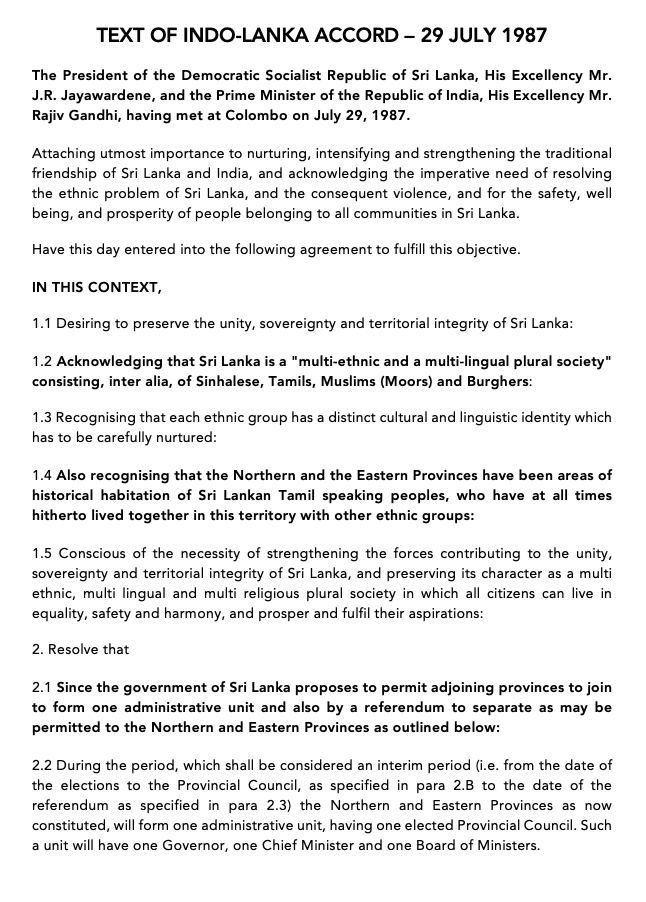
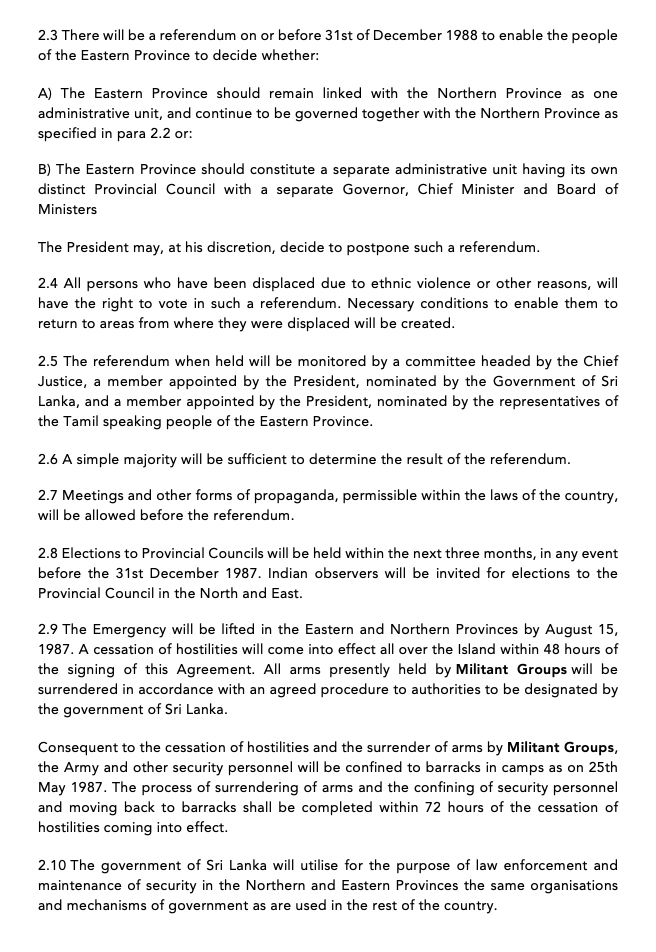

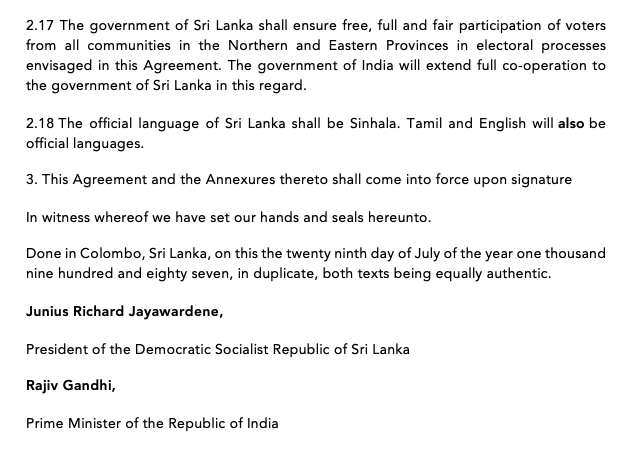
The Indo-Lanka Accord also has an annexure including 6 points
- Agreement by leaders of both nations to include representatives of the Election Commission of India to be observers at Referendum of NorthEast
- The NorthEast Provincial Council elections will have all para military withdrawn
- Sri Lanka shall absorb para military forces into regular security force of Sri Lanka
- Both leaders agree that Tamil Militants shall surrender arms to authorities designated by the President of Sri Lanka in the presence of Sri Lanka Red Cross & Indian Red Cross
- Both leaders agree to joint Indo-Lanka Observer Group for cessation of hostilities from 31 July 1987
- Both leaders agree that 2.14 & 2.16(C) of Indo-Lanka Accord, IPKF may be invited by Sri Lanka to guarantee & enforce cessation of hostilities.
As you can see the annexures to the Accord is only about elections to the merged NorthEast, absorbing of paramilitary groups to the Sri Lanka Armed Forces & the modus operandi of enforcing cessation of hostilities.

There is something really fishy & confusing about the EXCHANGE OF LETTERS.
Firstly, the letter between Indian PM & Sri Lankan President was written on 29 July 1987 – why should they be writing letters when the Indian PM was to arrive in Colombo to sign the Accord on 29 July. That these letters are part of the Accord is not mentioned. If so, why should these letters be officially accepted?
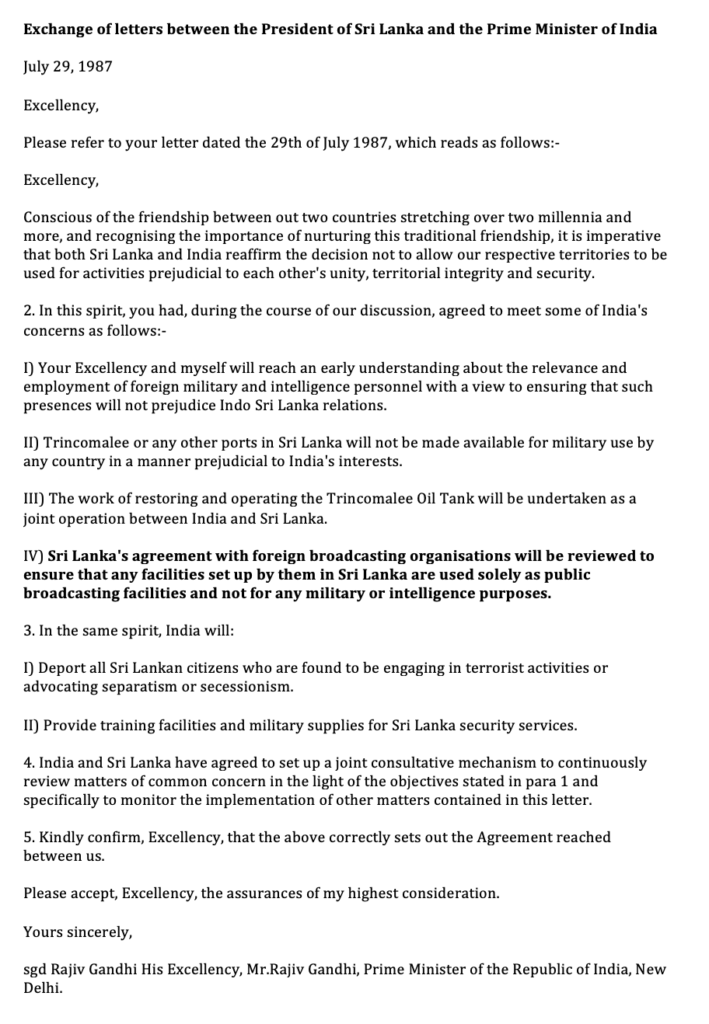
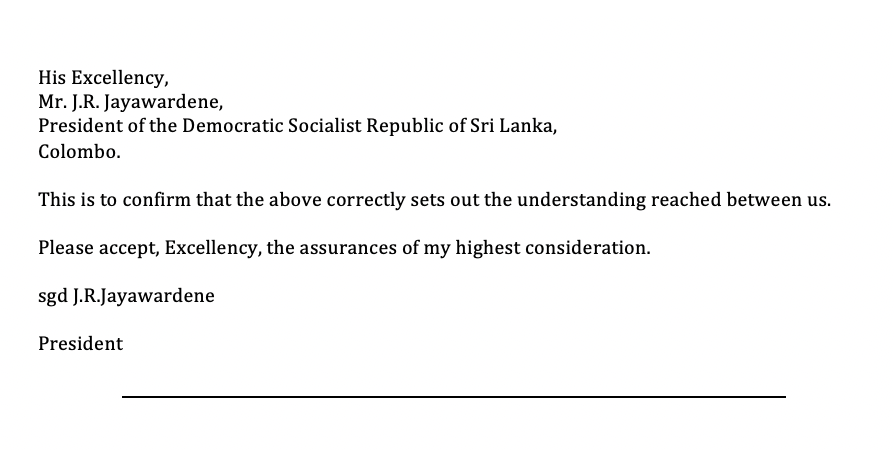
Exchange of letters between the President of Sri Lanka and the Prime Minister of India on 29 July 1987 (very day Indian PM lands in Colombo to sign Accord)
- Indian PM requests both to reaffirm that Sri Lanka or India would be used for activities prejudicial to each others unity, territorial integrity & security.
- SL President had agreed to: (SL’s commitment)
i) Foreign military & intel personnel will not be prejudicial to Indo-Lanka relations
ii) Trincomalee & other ports will not be made available for military use by any country prejudicial to India’s interest
iii) Restoring & operating Trinco Oil Tank as a joint operation between India & SL
iv) Review SL’s agreement with foreign broadcasting organizations to ensure they are not used for military or intel purposes
3. Indian PM agrees to:
i) Deport all Sri Lankan citizens engaged in terrorist activities/advocating separatism or secessionism
ii) Provide training, military supplies for SL security services
4. India & SL agree to set up joint consultative mechanism to review matters of common concern for para 1 & monitor implementation
5. Requesting SL President to confirm agreement between the two (note between two persons not two countries)
President JR is said to have written back confirming that what the Indian PM wrote ‘correctly sets out the understanding reached between us” (again note it is between 2 individuals only)
There are many other discrepancies that need to be questioned
- Where is the ORIGINAL DOCUMENT if the one in public domain is not true version
- Why should an exchange of letters between 2 individuals, which are not mentioned as being part of the annexure of the Accord, become officially accepted?
- Why should India decide the official language of Sri Lanka?
- Why should Accord include Trinco Port/Trinco Oil Tanks which were never demands of the LTTE or even Tamil leadership?
Over to you to think over these points & decide
Shenali D Waduge





